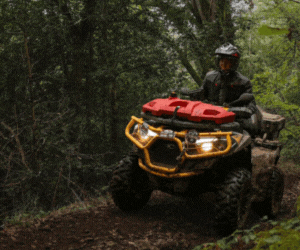
“The Recreational Trails Program is one of the most impactful federal initiatives supporting off-highway recreation,” said Christy LaCurelle, President and CEO of the MIC, ROHVA and SVIA in announcing efforts to fund the RTP. “Ensuring full funding will directly benefit riders and outdoor enthusiasts across the country.”
The RTP is a federal program that provides funding to states for the development and maintenance of recreational trails. It follows the “user-pay, user-benefit” model of the Highway Trust Fund, using revenue from federal fuel taxes collected on non-highway recreation to support trails for motorized and non-motorized use. Though OHV users contribute an estimated $281 million annually in fuel taxes, the program is currently funded at approximately $84 million per year. The new legislation seeks to close that gap and better align RTP funding with user contributions.
The Motorcycle Industry Council, Recreational Off-Highway Vehicle Association and Specialty Vehicle Institute of America commend the bipartisan group of lawmakers who reintroduced legislation to fully fund the Recreational Trails Program. Sponsored by Senator Amy Klobuchar of Minnesota and cosponsored by Senators James E. Risch of Idaho, Peter Welch of Vermont, Ted Budd of North Carolina, Thom Tillis of North Carolina, John Curtis of Utah, and Jeff Merkley of Oregon, S. 811 would ensure that RTP funding reflects the amount of fuel taxes that off-highway vehicle enthusiasts pay at the pump.
Senators Risch and Klobuchar noted that S. 811 “will ensure that federal funds collected for this program are maximized to support more trail projects in the future. The bill signals strong support for bringing the Recreational Trail Program funding in line with the revenue collected from the federal gas tax already paid by off-road recreational vehicle users without impacting funding for other federal transportation programs.”
“The user-pay, user-benefit model means motorcyclists and OHV riders will see their contributions better utilized to maintain and expand trail access,” LaCurelle said. “We thank Senators Klobuchar, Risch, Welch, Budd, Tillis, Curtis and Merkley for introducing this important legislation.”
By law, RTP grants are distributed as follows: 30% must be used for motorized recreation, 30% for non-motorized recreation and 40% for mixed-use trails that may or may not include motorized recreation. Since its creation in 1991, the RTP has funded thousands of projects, including trail maintenance, new trail construction, trailhead development, accessibility improvements, and outdoor education initiatives. The program supports a wide range of recreational activities, from OHV riding and driving to hiking, bicycling, equestrian use, cross-country skiing and snowmobiling.
LaCurelle concluded that the RTP’s benefits extend beyond trail users. “We look forward to continuing to work alongside advocates from all recreational sectors to support this vital program. Access to trails enhances outdoor recreation opportunities, improves physical and mental well-being, and strengthens local economies by driving tourism and community engagement.”
















